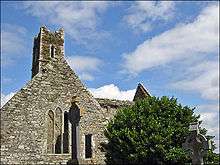Modomnoc
| Modomnóc of Ossory | |
|---|---|
 Timoleague Friary | |
| Born | 500s |
| Died | c. 550 |
| Feast | 13 February |
| Attributes | bees |
St. Modomnóc of Ossory (also Domnóc)(died c. 550) was an Irish saint and missionary in Osraige who was a disciple of St. David of Wales and a member of the O'Neill royal family.[1] His feast day is February 13.
Life
Modomnoc's name is likely to have been Dominic or Donogh but the Irish saints were so tenderly loved that the words "my", ("mo") "little" and "dear" were very often added to the names; hence Domnóc's name is often rendered mo Domnóc or Modomnóc. He left Ireland to train for the priesthood and crossed the sea to Wales to study under St. David at Menevia. All those who resided in the community were expected to share in the manual work as well as the study and worship.[2]
Beekeeper
One of the best known stories regarding Saint Modomnoc concerns his work as a beekeeper. Bees were kept both for their honey and the production of mead. Modomnoc was given charge of the bees in a sheltered corner of the monastery garden where he planted the kinds of flowers best loved by the bees.[2] He talked to the bees as he worked among them and they buzzed around his head in clouds as if they were responding. He would walk among the hives in the evening and talk to them, and the bees, for their part, would crowd out to meet him. He was never stung. When the time came for him to return to Ireland, three times the bees followed in great swarm and settled on the mast. St. David perceiving this occurrence to be a good omen allowed Modomnoc to bring the bees to Ireland.[3] When he landed, he set up a church at a place called Bremore, near Balbriggan, in County Dublin, and here he established the bees in a garden just like the one they had in Wales.
| “ | In a little boat, from the east, over the pure-colored sea, my Domnoc brought the gifted race of Ireland's bees. ~ Félire Óengusso[4] | ” |
Modomnoc's talking to his bees is in keeping with an Irish folklore custom of ‘Telling the Bees’ which ensures that the bees not feel any offence due to exclusion from family affairs and so will remain with the hive. It was believed that if one didn’t tell the bees of a wedding, a birth, or a death they would take offence and leave.[5] This same custom forms the basis of John Greenleaf Whittier's poem, "Telling the Bees".[6]
After his return home he served God at Tiprat Fachna (Tybroughney), in the western part of the kingdom of Ossory. Molaga founded churches at Tulach Min (Knockaneeun/ and at Teampall Molaga, near Kildorrery. "His last and perhaps greatest foundation was situated in Timoleague or Teach Molaga." an abbey still standing (though without a roof) on the County Cork Coast.[7] He is said to have been honoured with the episcopal dignity, about the middle of the 6th century.[8]
References
- ↑ C. Plummer, Miscellanea Hagiographica Hibernensis, p. 217; B.T.A., i. 322
- 1 2 Haggerty, Bridget, "The Bees Who would not be Left Behind", Irish Culture and Customs
- ↑ Walsh, Jim, "Saint Molaga of Bremore", Balbriggan & District Historical Society
- ↑ https://archive.org/stream/martyrologyoeng01stokgoog#page/n118/mode/2up
- ↑ Chaomhánach, Eimear, "The Bee, its Keeper and Produce, in Irish and other Folk Traditions", University College Dublin
- ↑ Whittier, John Greenleaf, "Telling the Bees"
- ↑ "Bees in Medieval Ireland', South West Cork Bee-Keepers' Association
- ↑ Butler, Alban. "St. Modomnoc, or Dominick, of Ossory, Bishop and Confessor", The Lives of the Saints, Volume II, 1866
External links
- HOLY FATHER MODOMNOC OF OSSORY, PATRON SAINT OF BEES Commemorated: February 13/26
- St. Modomnoc - Catholic Online
- Chaomhánach, Eimear, "The Bee, its Keeper and Produce, in Irish and other Folk Traditions", University College Dublin
- "A Saint and His Bees" by Dessi Jackson
- "Timoleague Abbey". www.irishtourist.com. Retrieved 20 September 2016.